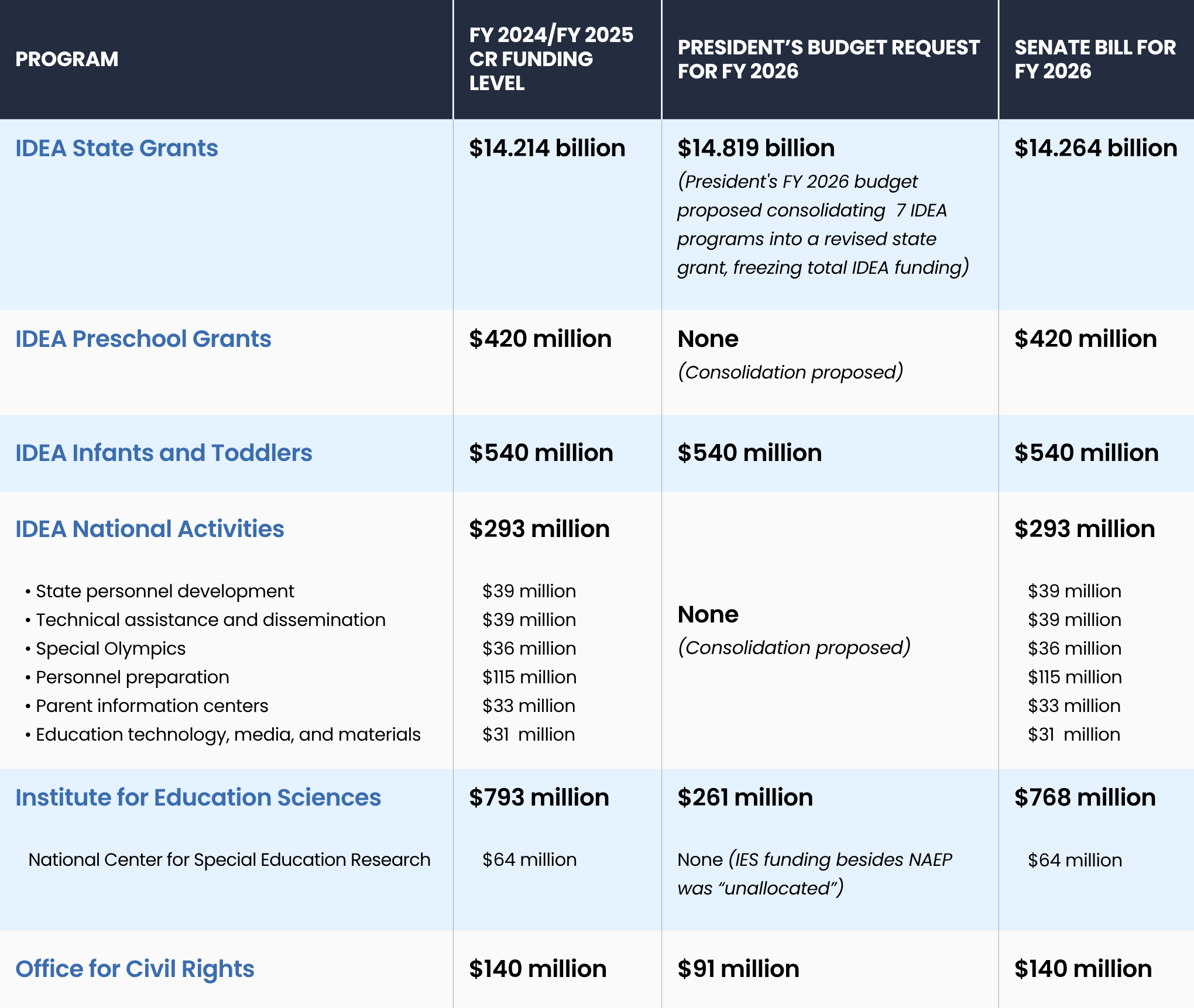July 2025 Policy News Round-Up
NCLD’s CEO testified before the Senate on threats to public education, SCOTUS cleared mass layoffs at ED, delayed funding for education programs is restored, and the Senate advances a bill for FY 2026 education funding. Learn more about what NCLD was up to in July.
Congress Passes Mega Tax Bill With Implications for Disabled Students and Individuals
On July 4, President Trump signed into law a sweeping budget reconciliation bill that includes the first national private school voucher program, alongside deep cuts to Medicaid and the Supplemental Nutrition Assistance Program (SNAP). The voucher program offers a permanent, uncapped dollar-for-dollar federal tax credit up to $1,700 for contributions to scholarship granting organizations (SGO). In a spotlight forum hosted by Sen. Maize Hirono, NCLD CEO Dr. Jacqueline Rodriguez expressed concern, stating, “it is deeply distressing that some members of congress are so willing to open up our federal pocketbook for this private school voucher program, but not to support the provision of a free and appropriate public education in public schools where, as a reminder, greater than 90% of students with disabilities attend.” Because the voucher program lacks a volume cap, its costs could exceed an estimated $56 billion per year, which would nearly fully fund IDEA.
NCLD’s CEO Participates In Spotlight Forum on K-12 Education
Dr. Jacqueline Rodriguez, the CEO of NCLD, testified before Senator Hirono and other Senators about the proposed federal education funding cuts and their negative impact on students with disabilities on July 24. During her testimony, Dr. Rodriguez called attention to the harm caused by delaying $7 billion in education funding, the prioritization of private school tax credits over IDEA funding, and the proposed 15% budget cut to the U.S. Department of Education that would result in mass layoffs, including within the Office for Civil Rights; “for over 50 years, section 504 of the rehabilitation act and IDEA have transformed education for millions of students with disabilities. Without federal oversight, we risk sliding back to a time when disability meant denial, not support.” Watch Dr. Rodriguez’s full testimony.
Senate Appropriations Committee Advances FY 2026 Appropriations Bill
The Senate Appropriations Committee approved its FY 2026 Labor-HHS-ED education bill on a 24-3 vote on July 31. This bill rejects the Administration’s proposals to cut and consolidate education funding programs. It provides funding for all parts of IDEA and prohibits funding from being used to transfer special education grants out of the U.S. Department of Education (USED) and requires USED to maintain sufficient staffing to “fulfill its statutory responsibilities.”
The House has yet to put forward a Labor-HHS-ED bill for FY 2026 and punted its scheduled markup until after the August congressional recess. Congress must pass appropriations bills or a Continuing Resolution (extension of current funding) by September 30, or the government will shut down.
See funding levels for programs impacting students with disabilities below:
After Illegally Withholding, ED Releases Education Funding
A nationwide freeze placed nearly $7 billion in federally approved education grants on hold on July 1, impacting programs under ESEA, teacher training, after-school services, supports for multilingual learners, and more. In response to strong bipartisan pressure (including a letter signed by ten Republican senators), the launch of edfundsnow.org, and legal challenges from multiple states, the administration reversed course. Read NCLD’s Senior Policy Manager’s blog post on these efforts.
SCOTUS Allows Terminations at the U.S. Department of Education
On July 14, SCOTUS lifted an injunction blocking the Trump Administration’s proposed workforce reductions at the U.S. Department of Education (USED). This decision cleared the way for the USED to terminate nearly 1,400 federal employees, slashing the agency’s staff by about half. Students who rely on services offered by the Office for Civil Rights and the Office of Special Education Programs will be severely affected. In an interview with Disability Scoop, Lindsay Kubatzky, NCLD’s Director of Policy and Advocacy, stated that the mass layoffs “will have devastating consequences for students with disabilities,” and that the unprecedented decision will “severely hamper the department’s ability to do its essential functions like safeguarding the civil rights of students with disabilities.” Read the full article here.
USED Issues AI Guidance and Proposed Funding Priority on AI
The U.S. Department of Education (USED) released new guidance for grantees on how federal funds can be used to support artificial intelligence (AI) in K-12 education. The Dear Colleague Letter outlines how AI may enhance instruction, tutoring, and career advising responsibly under existing federal programs if its use is aligned with current laws and regulations. Alongside the letter, USED proposed a new supplemental discretionary grantmaking priority focused on expanding AI literacy, improving access to computer science education, and supporting the responsible integration of AI tools in K-12 and higher education settings. The proposal encourages educator training, personalized instruction, and the use of AI to increase operational efficiency and improve student outcomes.
Join Our Advocacy Efforts!
NCLD’s Action Center enables you to contact your Members of Congress and make your voice heard on issues important to students with disabilities. New on the Action Center includes the opportunity to ask your Representative to endorse the RISE Act.
ICYMI
- Rep. McBath and Sen. Kaine introduced bill to restore cancelled programs supporting students with disabilities
- K-12 Senate HELP Subcommittee hosts hearing on school choice and literacy
- Committee for Education Funding publishes its FY 2026 budget book
- Additional political appointees join the U.S. Department of Education, including a Senior Advisor for the Office of Special Education and Rehabilitation Services
What We’re Reading:
- Stanford Accelerator for Learning; AI + Learning Differences: Designing a Future with No Boundaries
- The 74M: For Decades, the Feds Were the Last, Best Hope for Special Ed Kids. What Happens Now?
- EdTrust: An Equitable Approach to Improving Literacy
- All4Ed and Urban Institute: Let’s Measure Ready

